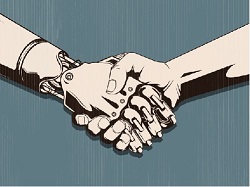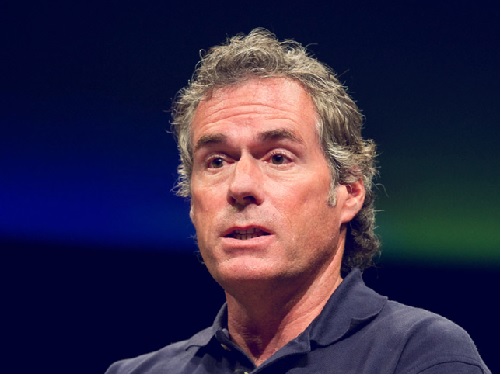May-June Innovation
World News Innovation
The oracle of arithmetic works best without writing down a thing
by Erica Klarreich
Source: Wired, 3 July

Peter Scholze is a 28-year old revolutionary mathematician, favorite for the Fields Medal, who studies perfectoid spaces, where number theory and geometry come together in a tangible way, that makes esoteric mathematical structures concrete.
Read more:
http://www.wired.com/2016/07/the-oracle-of-arithmetic/
March of the machines
Source: The Economist, 25 June

More than the nightmare of an AI outwitting its human creator, the most plausible fear of the machinery question today is the loss of jobs in the transition to AI, with a growing income inequality that Governments will have to respond with new education and welfare systems.
Read more:
Frankestein’s paperclips
Source: The Economist, 25 June

AI puts existential threats to humanity. Illuminated minds worry that this technology can be turn evil, someones think that the solution is openness against the monopoly of the machines, others see in a widely available superintelligence a danger.
Read more:
From not working to neural networking
Source: The Economist, 25 June

The so-called artificial neural networks are the base of deep learning, that simulates the neural mechanisms of the brain. The chips specialized on creating graphics and imaginary worlds for videogames, help computers understand the real world.
Read more:
Answering the machinery question
Fonte: The Economist, 25 June

While the same concerns of two century ago are prompting from the impressive development of AI, new perspectives are opening to humankind, like the use of AI to analyze huge amounts of data and papers, in fields such medical and scientific research.
Read more:
The return of the machinery question
Source: The Economist, 25 June

The astonishing recent progress in AI is awakening old fears from the industrial revolution about the automation of work, and raises new ones and more scaring. Meanwhile, AI carries on growing up with an autonomy that exceeds what is explicitly programmed and with astronomic amount of money invested.
Read more:
Singapore: a smart nation
by Tom Benner
Source: Scientific American, 5 May

Evolving from a seaport between China and India to a smart nation of the first world, Singapore demonstrates in facing the challenges of megacities, like lack of natural resources and aging population, that technology can power healthcare and economy and make the life better.
Read more:
http://www.scientificamerican.com/products/singapore-a-smart-nation/#!/
Quantum computer makes first high-energy physics simulation
by Davide Castelvecchi
Source: Nature, 22 June

Physicists of Innsbruck university have performed on a quantum computer the simulation of a nuclear physics experiment, what is too complex for an ordinary computer, hoping to develop quantum calculations to experiments on strong nuclear force.
Read more:
http://www.nature.com/news/quantum-computer-makes-first-high-energy-physics-simulation-1.20136
China’s new supercomputer puts the US even further behind
by Brian Barrett
Source: Wired, 21 June

China has produced the fastest supercomputer in the world, that worries the USA, since implementing computing power is necessary for national security, for scientific progress and health systems.
Read more:
http://www.wired.com/2016/06/fastest-supercomputer-sunway-taihulight/
A new model organism could double the pace of biology
by Sarah Zang
Source: Wired, 21 Giugno

Scientists are searching world-changing microbes. An important discovery is the V. Natriegens, a microbe that grows up much faster than Escherichia coli and can be useful for lab experiments.
Read more:
http://www.wired.com/2016/06/new-model-organism-double-pace-biology/
Get ready for quieter NYC subway stations (yes, it’s possible)
by Aarian Marshall
Source: Wired, 16 June

In a virtual sonic space, engineers of Arup are building digital models of the NYC subway on the base of sounds collected from existing stations, and study gently curved spaces and low-vibration padded tracks encased in rubber for the passengers' safety. No more “badumps”.
Read more:
https://www.wired.com/2016/06/get-ready-quieter-nyc-subway-stations-yes-possible/
Magic Leap’s next move? Bringing C-3PO to your house
by Peter Rubin
Source: Wired, 16 June

A new partnership between Magic Leap and Lucasfilm is developing immersive platforms of virtual reality with a Star Wars related content. We will succeed in taking off C-3PO of the screen, soon an army of stormtroopers will be searching for us, and we will turn into actors.
Read more:
http://www.wired.com/2016/06/magic-leap-lucasfilm/
Bionic leaf makes fuel from sunlight, water and air
by David Biello
Source: Scientific American, 2 June

Scientists have created a bionic leaf that produces fuel thanks to solar electricity and microbes,and is more efficient than natural photosynthesis. The idea is to reverse the CO2 piling up in the atmosphere to build renewable fuels, just as plants do.
Read more:
http://www.scientificamerican.com/article/bionic-leaf-makes-fuel-from-sunlight-water-and-air1/
Where the smart is
Source: The Economist, 11 June

For years we have been told that Internet would have transformed our domestic space, breathing life on every material object. But consumers are not convinced to allow the Internet to play in every corner of their life.
Read more:
Google moves closer to a universal quantum computer
by Philip Ball
Source: Nature, 8 June

Google has realized a functioning prototype of a universal quantum computer, a device based on qubits, combining a digital and an analogic approach, that can solve unresolved problems in fields such as chemistry and condensed-matter physics, with the potential to be scaled up to larger systems.
Read more:
http://www.nature.com/news/google-moves-closer-to-a-universal-quantum-computer-1.20032
Backyard detectives out-spy the spies orbiting above
by Nick Stockton
Source: Wired, 9 June

The USA is launching a secret satellite that will suck up intel from whichever region it happens, but is trackable by many more or less amatorial satellite trackers. Will be it able to see UFOs? Should we believe it or is it only science-fiction?
Read more:
http://www.wired.com/2016/06/backyard-detectives-search-for-snooping-space-satellites/
Come on, let’s give the robots hands already
by Clive Thompson
Source: Wired, 9 June

Robots lack hands. They are incredibly able to understand the world, but they’re terrible at using it. Whereas we are masterful at dealing with mess and uncertainty, they arrive exactly where they are expected to arrive, hence they won’t replace us.
Read more:
http://www.wired.com/2016/06/robot-body-parts/
Inside OpenAI, Elon Musk’s wild plan to set artificial intelligence free
by Cade Metz
Source: Wired, 27 May

OpenAI is a new non-profit company which works on the most 21st-century transformative technology and aims to make it public for free. A shared vision, without a central control, is what reduces the risk that super-intelligence would be monopolized.
Read more:
Hacker lexicon: what is the Digital Millennium Copyright Act?
by Kim Zetter
Source: Wired, 6 June

U.S. Congress is preparing a reform of the Digital Millennium Copyright Act, the law passed in 1998 that makes illegal to duplicate works covered by copyright circumventing protections and controls ensured by this right, and that has been abused by companies against competitors.
Read more:
https://www.wired.com/2016/06/hacker-lexicon-digital-millennium-copyright-act/
Lo and Behold: watch Werner Herzog ask Elon Musk to take him to Mars
by Angela Watercutter
Source: Wired, 31 May

On 19 August will come out in US theaters Lo and Behold, Reveries of the Connected World, a Werner Herzog’s documentary which examines Internet revolution, that was invented to be used by armies and has now achieved cloisters, where even monks tweet.
Read more:
http://www.wired.com/2016/05/werner-herzog-internet-doc-trailer/
The White House is finally prepping for an AI-powered future
by April Glaser
Source: Wired, 30 May

Urgent questions are pressing policy about artificial intelligence, to ensure its safety, controllability and predictability. A White House report has outlined the discriminatory potential of Big Data, that reproduce existing bias and structural iniquities in risk assessments and in deciding paroles, mortgages, jobs.
Read more:
http://www.wired.com/2016/05/white-house-finally-prepping-ai-powered-future/
In dramatic statement, European leaders call for ‘immediate’ open access to all scientific papers by 2020
by Martin Enserink
Source: Science, 27 May

This statement is important because until now scientific papers have been made available by not OA journals only 6 or 12 months after publication, but by 2020 they will be freely available when published. What the European Union needs is to create institutional repositories for its scientific output.
Read more:
Silicon Valley and "Disruptive" War Research
by John Horgan
Source: Wired, 28 May

The Pentagon has opened an office in Silicon Valley considering the advances in technology as a matter of national and global security. Although technology makes a better world, its weapons kill, are autonomous and can sleep beyond our control.
Read more:
http://blogs.scientificamerican.com/cross-check/silicon-valley-and-disruptive-war-research/
U.S. lawmaker orders NASA to plan for trip to Alpha Centauri by 100th anniversary of moon landing
by Daniel Clery
Source: Science, 23 May

NASA has been ordered by its control panel begin realizing the Breakthrough Starshot project, which plans a mission to Alpha Centauri. The technologies experimented for these trips of tiny spacecraft that reach unimaginable speeds are really science-fiction .
Read more:
Soon You’ll Swallow Origami Pills and Get Magnetic Colonoscopies
by Matt Simon
Source: Wired, 26 May
Medicine is becoming more and more technological. The future of surgery is incision-free, and painful and invasive examinations such as colonoscopy will be made without pushing a tube through the bowels and through extracorporeal magnetic fields.
Read more:
http://www.wired.com/2016/05/soon-youll-swallow-origami-pills-get-magnetic-colonoscopies/
To glimpse particles from the most energetic events in the universe, astronomers must build truly gigantic detectors.
by Spencer Klein
Source: Scientific American, 26 May

Larger optical telescopes could be deployed in ice or in waters, similarly to IceCube or ANTARES, in order to study the neutrino matter. If national funding and budgets will allow it, the next generation of observatories will find the astrophysical sources of ultra-energetic neutrinos.
Read more:
http://www.scientificamerican.com/article/bigger-is-better-for-neutrino-astronomy/
New evidence could overthrow the standard view of quantum mechanics
by Dan Falk
Source: Wired, 21 May

In the quantic physics, the Bohmian theory seems to return to the Newtonian physics, asserting that every particle has a precise, definite location, but with the difference that classical mechanics is based on adjacency and is “local”, whereas quantic mechanics is nonlocal and “surreal”.
Read more:
http://www.wired.com/2016/05/new-support-alternative-quantum-view/
Balloons. NASA Is Using Balloons to Study Space
by Emma Grey Ellis
Source: Wired, 19 May

Nasa has sent this week skyward 1.000 feet up a pressurized balloon with a gamma-ray telescope that will circumnavigate the globe and, if it works, will give scientists deeper insights into nuclear physics.
Read more:
http://www.wired.com/2016/05/future-space-science-depends-balloons/
Scientists track last 2,000 years of British evolution
by Anna Nowogrodzki
Source: Nature, 17 May

Researchers have developed a method to track very recent changes in the human genome. This technique is based on a statistical analysis of whole-genome sequences and is able to pinpoint the adaptation of complex traits determined by genetic variants that are favored under natural selection.
Read more :
http://www.nature.com/news/scientists-track-last-2-000-years-of-british-evolution-1.19917
Humans are still evolving—and we can watch it happen
by Elizabeth Pennisi
Source: Science, 17 May

Thanks to the genomic revolution, today we are able to observe the evolution in action, seeing not only how our genomes have changed over centuries, but also in the last generation, and this sheds a new light on understanding human evolution.
Read more:
http://www.sciencemag.org/news/2016/05/humans-are-still-evolving-and-we-can-watch-it-happen
Soon we won’t program computers. We’ll train them like dogs
by Jason Tanz
Source: Wired, 17 May

Whereas the traditional programming writes the instructions for the computer to follow step-by step, the machine learning creates huge data networks that mimic the connections of neurons in the brain, with a plasticity similar to what we can see in epigenetics.
Read more:
http://www.wired.com/2016/05/the-end-of-code/#slide-2
Sometimes we need human employees, Facebook admits
by Julia Greenberg
Source: Wired, 12 May

To select the topics most popular and inject them in the trending section, Facebook uses not only algorithms but also a team of people who make value judgments.
Read more:
http://www.wired.com/2016/05/facebook-acknowledges-sometimes-needs-humans/
Nasa jet propulsion lab’s new chief has big plans for space robots.
by Nick Stockton
Source: Wired, 8 May
The Nasa’s Jet Propulsion Laboratory, that builds robots for solar system’s exploration and is taking a strong role in discovering new Earths and new Oceans, has announced a crewed mission to Mars.
Read more:
http://www.wired.com/2016/05/jpls-new-director-life-beyond-earth/
Video: Robot surgeons make a big advance
By John Bohannon
Source: Science, 4 May
Until now, robots in the surgery have been driven by surgeons as a “third hand”. This video shows a new system, which uses a robotic arm which eight degrees of freedom, impossible to reach for humans. The results are astonishing.
Read more:
http://www.sciencemag.org/news/2016/05/video-robot-surgeons-make-big-advance
Why An Autonomous Robot Won’t Replace Your Surgeon Anytime Soon
By Sarah Zang
Source: Wired, 4 May
The Smart Tissue Autonomous Robot can intervene on soft tissues and execute autonomously suturing tasks, but it still depends on the surgeon under different sides.
Read more:
http://www.wired.com/2016/05/robot-surgeon/
The Untold Story of Magic Leap, the World’s Most Secretive Startup
by Kevin Kelly
Source: Wired

Magic Leap isn't the only start-up that produces virtual reality, but the quality of experience that offers to our senses and the money invested allow it to be one of the largest companies ever set up. The authenticity of its experience promises unexpected revolutions.
Read more:
http://www.wired.com/2016/04/magic-leap-vr/

